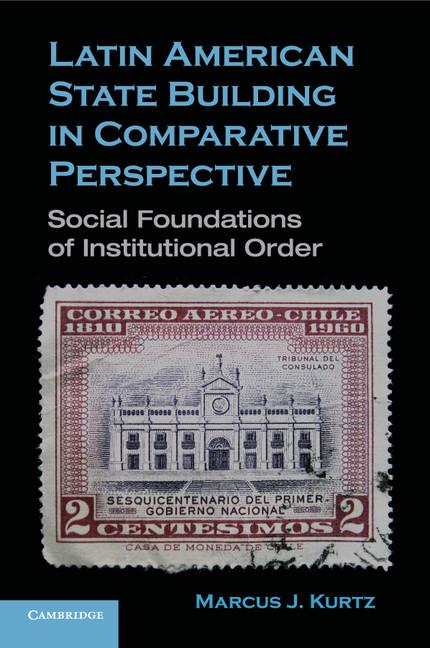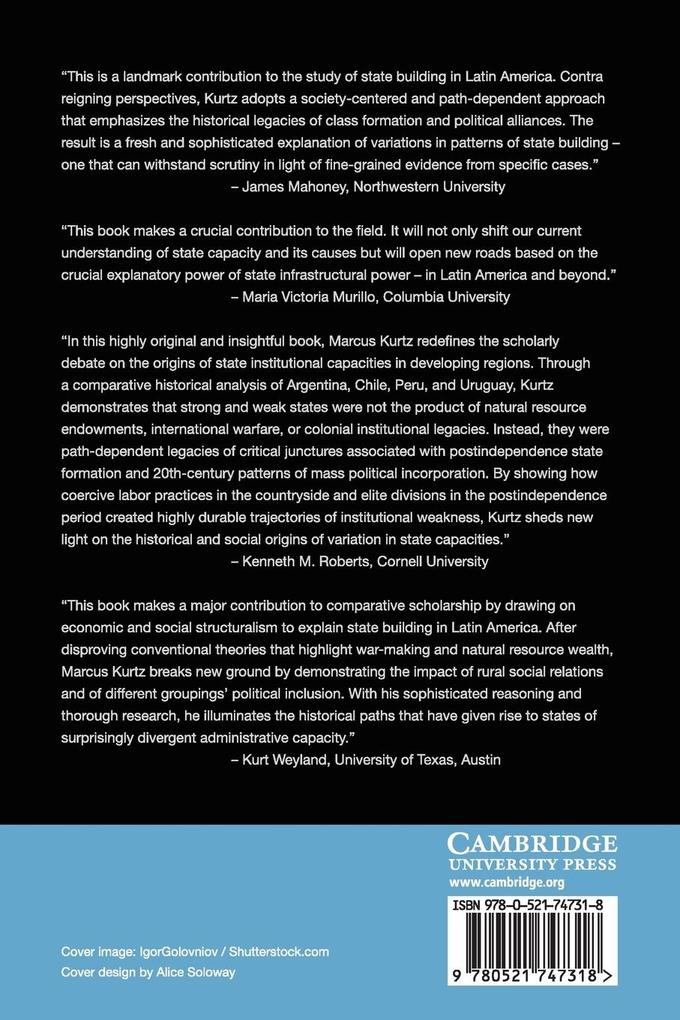
Zustellung: Di, 17.06. - Fr, 20.06.
Versand in 6 Tagen
VersandkostenfreiBestellen & in Filiale abholen:
This book provides an account of long-run institutional development in Latin America that emphasizes the social and political foundations of state-building processes.
Inhaltsverzeichnis
1. The difficulties of state building; 2. The social foundations of state building in the contemporary era; 3. State formation in Chile and Peru: institution building and atrophy in unlikely settings; 4. State formation in Argentina and Uruguay: agrarian capitalism, elite conflict, and the construction of cooperation; 5. Divergence reinforced: the timing of political inclusion and state strength in Chile and Peru; 6. The social question and the state: mass mobilization, suffrage, and institutional development in Argentina and Uruguay; 7. Conclusions, implications, and extensions: social foundations, Germany/Prussia, and the limits of contemporary state building; Bibliography.
Produktdetails
Erscheinungsdatum
12. Februar 2015
Sprache
englisch
Seitenanzahl
286
Autor/Autorin
Marcus J. Kurtz
Verlag/Hersteller
Produktart
kartoniert
Gewicht
468 g
Größe (L/B/H)
229/152/17 mm
ISBN
9780521747318
Entdecken Sie mehr
Pressestimmen
"This is a landmark contribution to the study of state building in Latin America. Contra reigning perspectives, Kurtz adopts a society-centered and path-dependent approach that emphasizes the historical legacies of class formation and political alliances. The result is a fresh and sophisticated explanation of variations in patterns of state building - one that can withstand scrutiny in light of fine-grained evidence from specific cases." - James Mahoney, Northwestern University "This book makes a crucial contribution to the field. It will not only shift our current understanding of state capacity and its causes but will open new roads based on the crucial explanatory power of state infrastructural power - in Latin America and beyond." - Maria Victoria Murillo, Columbia University "In this highly original and insightful book, Marcus Kurtz redefines the scholarly debate on the origins of state institutional capacities in developing regions. Through a comparative historical analysis of Argentina, Chile, Peru, and Uruguay, Kurtz demonstrates that strong and weak states were not the product of natural resource endowments, international warfare, or colonial institutional legacies. Instead, they were path-dependent legacies of critical junctures associated with post-independence state formation and 20th-century patterns of mass political incorporation. By showing how coercive labor practices in the countryside and elite divisions in the post-independence period created highly durable trajectories of institutional weakness, Kurtz sheds new light on the historical and social origins of variation in state capacities." - Kenneth M. Roberts, Cornell University "This book makes a major contribution to comparative scholarship by drawing on economic and social structuralism to explain state building in Latin America. After disproving conventional theories that highlight war-making and natural resource wealth, Marcus Kurtz breaks new ground by demonstrating the impact of rural social relations and of different groupings' political inclusion. With his sophisticated reasoning and thorough research, he illuminates the historical paths that have given rise to states of surprisingly divergent administrative capacity." - Kurt Weyland, University of Texas, Austin
Bewertungen
0 Bewertungen
Es wurden noch keine Bewertungen abgegeben. Schreiben Sie die erste Bewertung zu "Latin American State Building in Comparative Perspective" und helfen Sie damit anderen bei der Kaufentscheidung.










